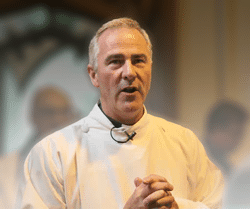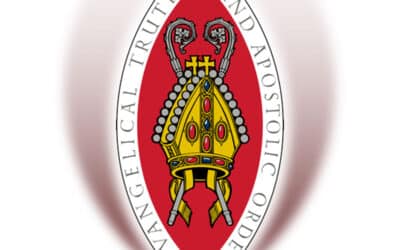The images that we are seeing on our television screens of the wars in The Holy Land and Ukraine leave us all shocked, horrified, angry and sad beyond belief.
War is inhuman, and the words of St John Paul (formerly Pope John Paul II) on the subject are particularly relevant. He wrote: “the scale and horror of modern warfare – whether nuclear or not – makes it totally unacceptable as a means of settling differences between nations. War should belong to the tragic past, to history; it should find no place on humanity’s agenda for the future.” We must pray that one result of these latest wars will be to convince people of this truth – and yet, already the nations are restocking their armouries with the newest and latest weapons and planning the next offensive. If we are really serious that war “should find no place on humanity’s agenda for the future” we have to devote a great deal more energy and resources to effective ways of avoiding war, and that will not be easy, because evil is at work in the world, and evil can do terrible things when it takes root in human hearts. There is a major task ahead for all committed peace-makers.
Such thoughts link our experience of recent months with those terrible events in Jerusalem two thousand years ago. We can see a reflection of the sufferings of Jesus in all human afflictions and tragedies, because Jesus assures us that God himself stoops down to share our sorrows and our pains. That is part of the Good News which the Church exists to proclaim: wherever God’s children suffer, God himself in Christ is beside them, sharing their sufferings with them and for them. But that is only a part of the Good News: there is only limited help in knowing that someone is with you in your pain and what we really need is someone who can do something about it. We cannot separate Good Friday and Easter, because the Resurrection does not reverse what happened on Good Friday but it does show us how to interpret it. On the cross a man was also locked in terrible combat with death itself and all the powers of darkness and conquered them by his refusal to capitulate to their demands. They could not break his obedience and his love even although he was tried to the uttermost. The triumph that rings out at Easter is the triumph of life over death, of love over hatred, of service over self.
It is the task of the Easter-Christians to put this vision into effect in daily living. The Cross shows us a power the world does not understand, the power of unflinching love, which is the power of God. In earthly terms, Jesus nailed to the cross was utterly powerless, but he, not the Jewish politico-religious establishment or the Roman military machine, won the lasting victory, a moral and spiritual victory. But so often we are completely blind to that dimension of human affairs. “The human race is afraid and it’s fears are about power – about having it or not having it”, wrote Archbishop Michael Ramsey. “Those who have it are frightened of those with it. This is true of groups, classes, nations and races.” To live by faith is to live in the conviction that the resources made available to us through the cross and resurrection of Jesus can enable us to confront the powers of darkness in God’s world. What is frightening about war is that so often both sides are operating with similar moral values and systems but one is more efficient militarily than the other – might, not right, eventually conquers.
But can we really do anything? “Tragic things happen, cruel deeds are done, things seem to have got out of hand, God’s hand as well as ours. How can the prayers of individuals or even congregations help to cure such tragedies and widespread evil?” writes Bishop George Appleton (formerly Archbishop of Jerusalem”. “Our prayers keep such situations tied to God and prevent God being pushed out. The second clue is that most man-made situations arise from wrong attitudes within the minds and spirits of people, so that the struggle is basically a spiritual one. Prayer is a spiritual activity and operates within the spirit of the one who prays and also within the spirits of those prayed for.”
In Gethsamane Jesus warned us that “all who take the sword will die by the sword” (Matthew 26: 52). Violence is continuous – once you start you cannot escape from it; it is reciprocal and it generates its own momentum so that it is not possible to say “thus far and no further” once violence has been engaged in – notice the subtle shift of justification in the course of conflict as the level of violence increases and what was once unacceptable gradually becomes acceptable and then laudable. These are the things that must be tackled by all who are committed to erasing war from humanity’s agenda. Too often our concern for peace takes second (or third or fourth) place to our comfort and other consequences of power.
It is surely significant that our Lord’s first words to his disciples after the resurrection were: “Peace be with you”. Peace is at the top of God’s agenda and we cannot rest content until it is top of humanity’s agenda as well. The Church must be a community devoted to praying for peace and working for peace in every human situation, because the risen Lord has chosen us to be his agents, to be the ministers of his work of reconciliation, in the world. We cannot do Christ’s work by any means other than his own, and on the cross he showed us the prayerful, forgiving love and the obedience to the Father’s will despite the cost to himself, which are the secret of the victory he won for us and for all people everywhere.
May our Lord’s resurrection bring us new joy and new hope, so that we are all renewed in our work for peace wherever we are, that peace which is Christ’s bequest to his church and through his church to the world. “Blessed are the peacemakers: they shall be called the children of God”, Jesus promised (Matthew 5: 9). Pray that God’s blessing may be upon all who work for peace and may prosper all their efforts; and pray that we who know ourselves to be God’s children may give effective witness to this wonderful status by working ceaselessly to bring peace wherever there is hostility, suspicion, hatred or fear.
May the peace of the risen Christ fill your hearts and your homes.

